Study Skills: Time Management for Academic Success in Higher Education
VerifiedAdded on 2021/02/19
|8
|1814
|48
Report
AI Summary
This report delves into the critical aspects of time management and study skills within the context of higher education. It begins by defining time management and highlighting its numerous benefits, such as increased efficiency, productivity, and reduced stress. The report then discusses how effective time management can be leveraged to design both short-term and long-term study plans, offering a practical example of a student's hourly schedule. Furthermore, it identifies and evaluates common obstacles that hinder effective time management, including procrastination, lack of organization, and numerous interruptions. The report underscores the importance of self-reflection and the adoption of innovative strategies to overcome these challenges, ultimately aiming to equip students with the tools to balance their academic and personal lives. The report concludes by emphasizing the importance of prioritizing tasks and making the most of available resources, ultimately leading to improved academic performance and reduced stress levels. The provided document is a past paper contributed by a student to Desklib, a platform offering AI-based study tools.
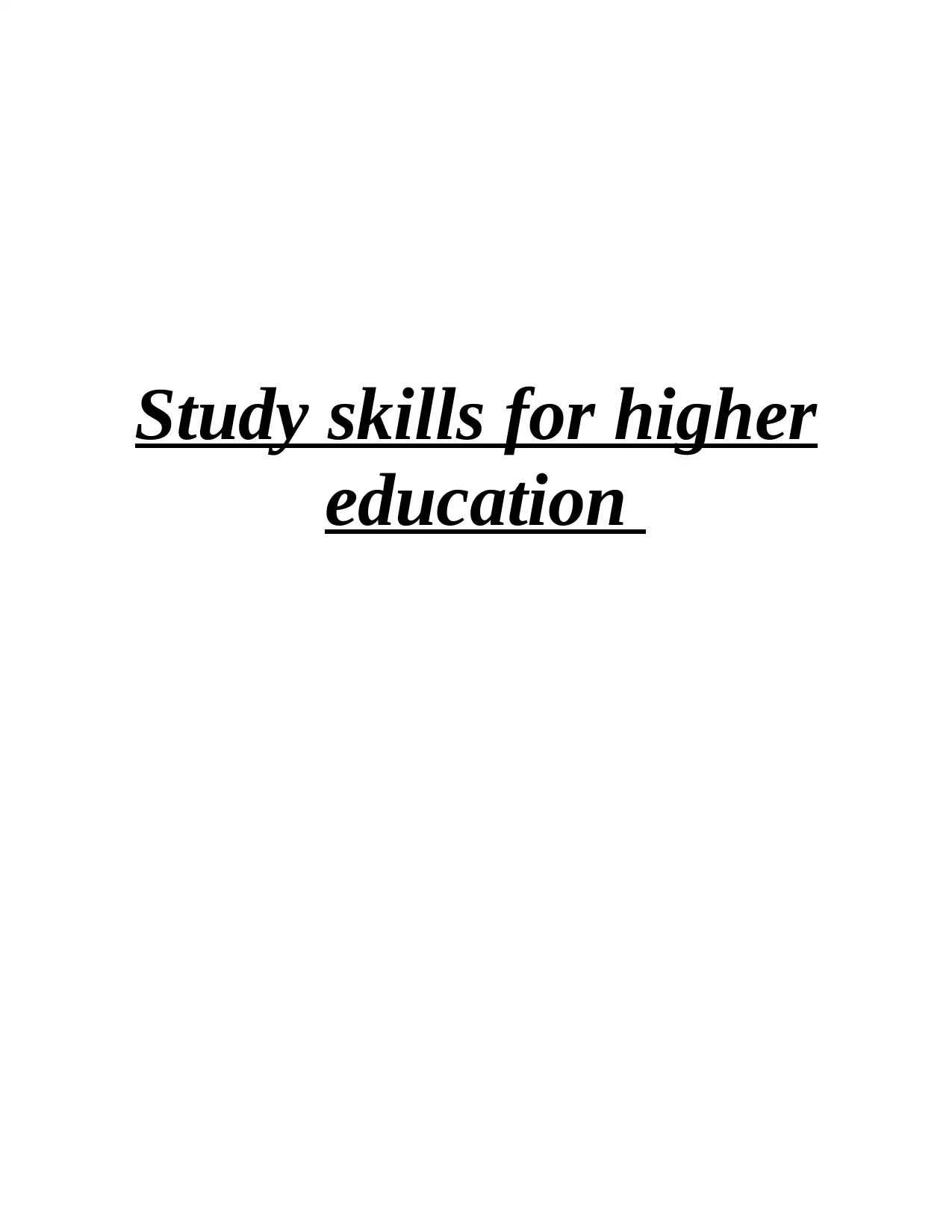
Study skills for higher
education
education
Paraphrase This Document
Need a fresh take? Get an instant paraphrase of this document with our AI Paraphraser
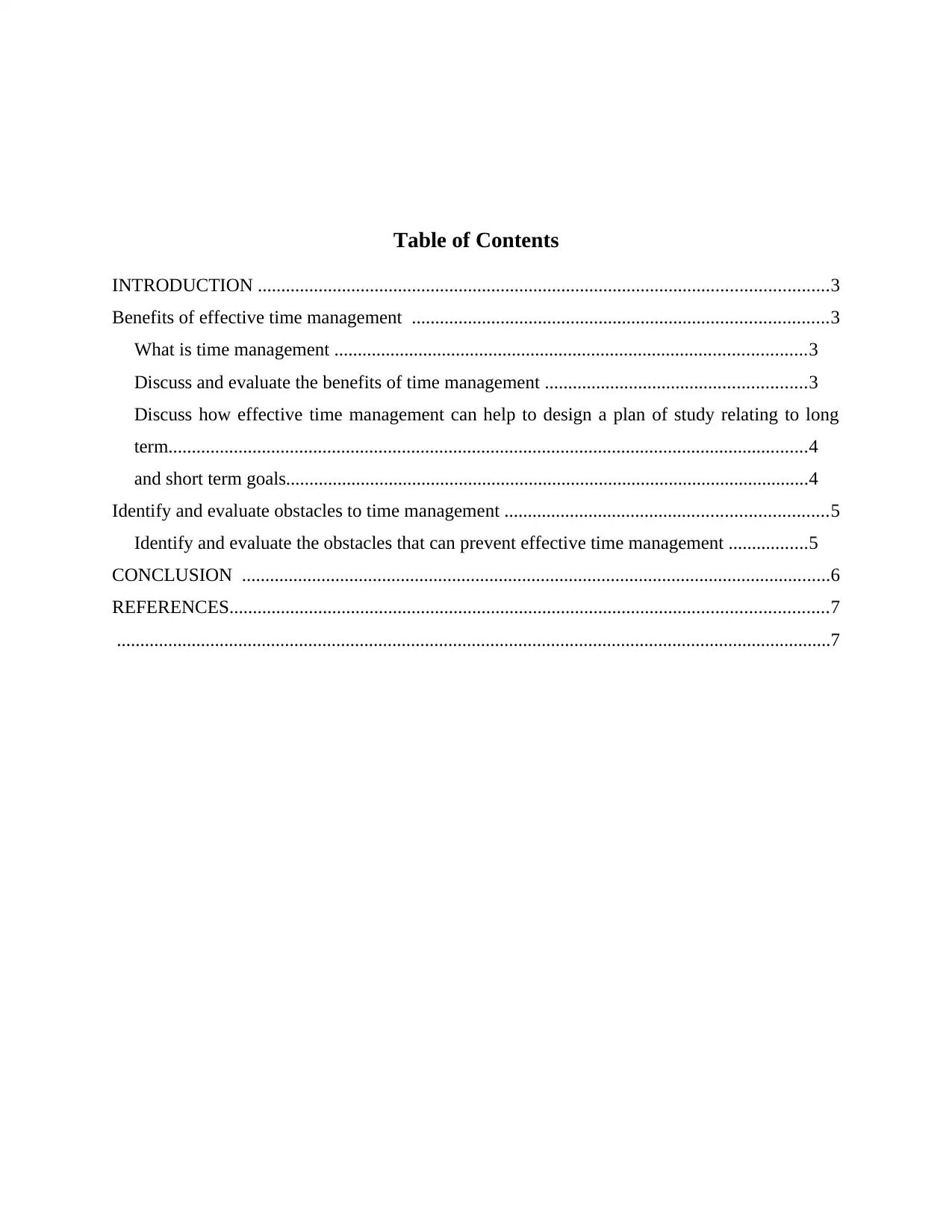
Table of Contents
INTRODUCTION ..........................................................................................................................3
Benefits of effective time management .........................................................................................3
What is time management .....................................................................................................3
Discuss and evaluate the benefits of time management ........................................................3
Discuss how effective time management can help to design a plan of study relating to long
term.........................................................................................................................................4
and short term goals................................................................................................................4
Identify and evaluate obstacles to time management .....................................................................5
Identify and evaluate the obstacles that can prevent effective time management .................5
CONCLUSION ..............................................................................................................................6
REFERENCES................................................................................................................................7
.........................................................................................................................................................7
INTRODUCTION ..........................................................................................................................3
Benefits of effective time management .........................................................................................3
What is time management .....................................................................................................3
Discuss and evaluate the benefits of time management ........................................................3
Discuss how effective time management can help to design a plan of study relating to long
term.........................................................................................................................................4
and short term goals................................................................................................................4
Identify and evaluate obstacles to time management .....................................................................5
Identify and evaluate the obstacles that can prevent effective time management .................5
CONCLUSION ..............................................................................................................................6
REFERENCES................................................................................................................................7
.........................................................................................................................................................7
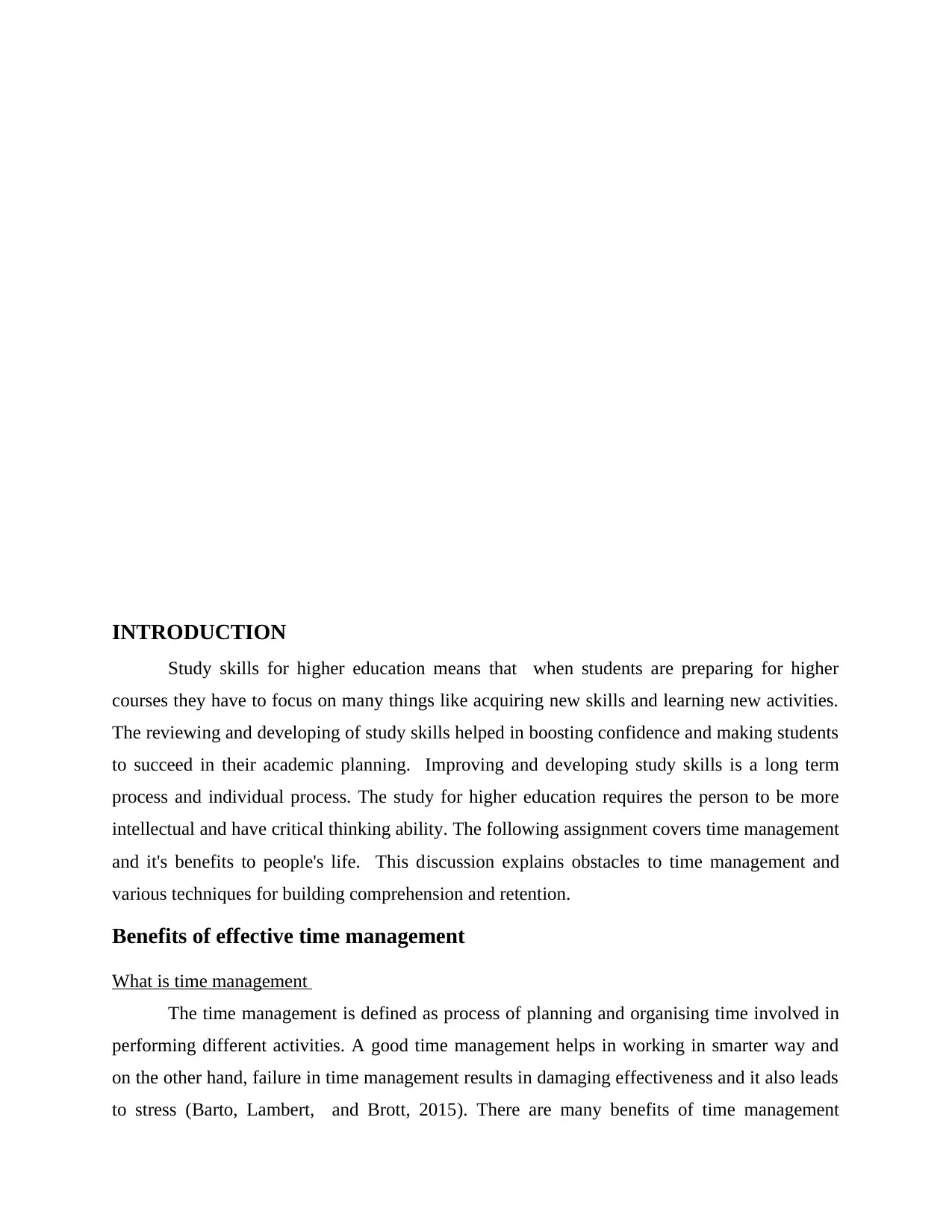
INTRODUCTION
Study skills for higher education means that when students are preparing for higher
courses they have to focus on many things like acquiring new skills and learning new activities.
The reviewing and developing of study skills helped in boosting confidence and making students
to succeed in their academic planning. Improving and developing study skills is a long term
process and individual process. The study for higher education requires the person to be more
intellectual and have critical thinking ability. The following assignment covers time management
and it's benefits to people's life. This discussion explains obstacles to time management and
various techniques for building comprehension and retention.
Benefits of effective time management
What is time management
The time management is defined as process of planning and organising time involved in
performing different activities. A good time management helps in working in smarter way and
on the other hand, failure in time management results in damaging effectiveness and it also leads
to stress (Barto, Lambert, and Brott, 2015). There are many benefits of time management
Study skills for higher education means that when students are preparing for higher
courses they have to focus on many things like acquiring new skills and learning new activities.
The reviewing and developing of study skills helped in boosting confidence and making students
to succeed in their academic planning. Improving and developing study skills is a long term
process and individual process. The study for higher education requires the person to be more
intellectual and have critical thinking ability. The following assignment covers time management
and it's benefits to people's life. This discussion explains obstacles to time management and
various techniques for building comprehension and retention.
Benefits of effective time management
What is time management
The time management is defined as process of planning and organising time involved in
performing different activities. A good time management helps in working in smarter way and
on the other hand, failure in time management results in damaging effectiveness and it also leads
to stress (Barto, Lambert, and Brott, 2015). There are many benefits of time management
⊘ This is a preview!⊘
Do you want full access?
Subscribe today to unlock all pages.

Trusted by 1+ million students worldwide
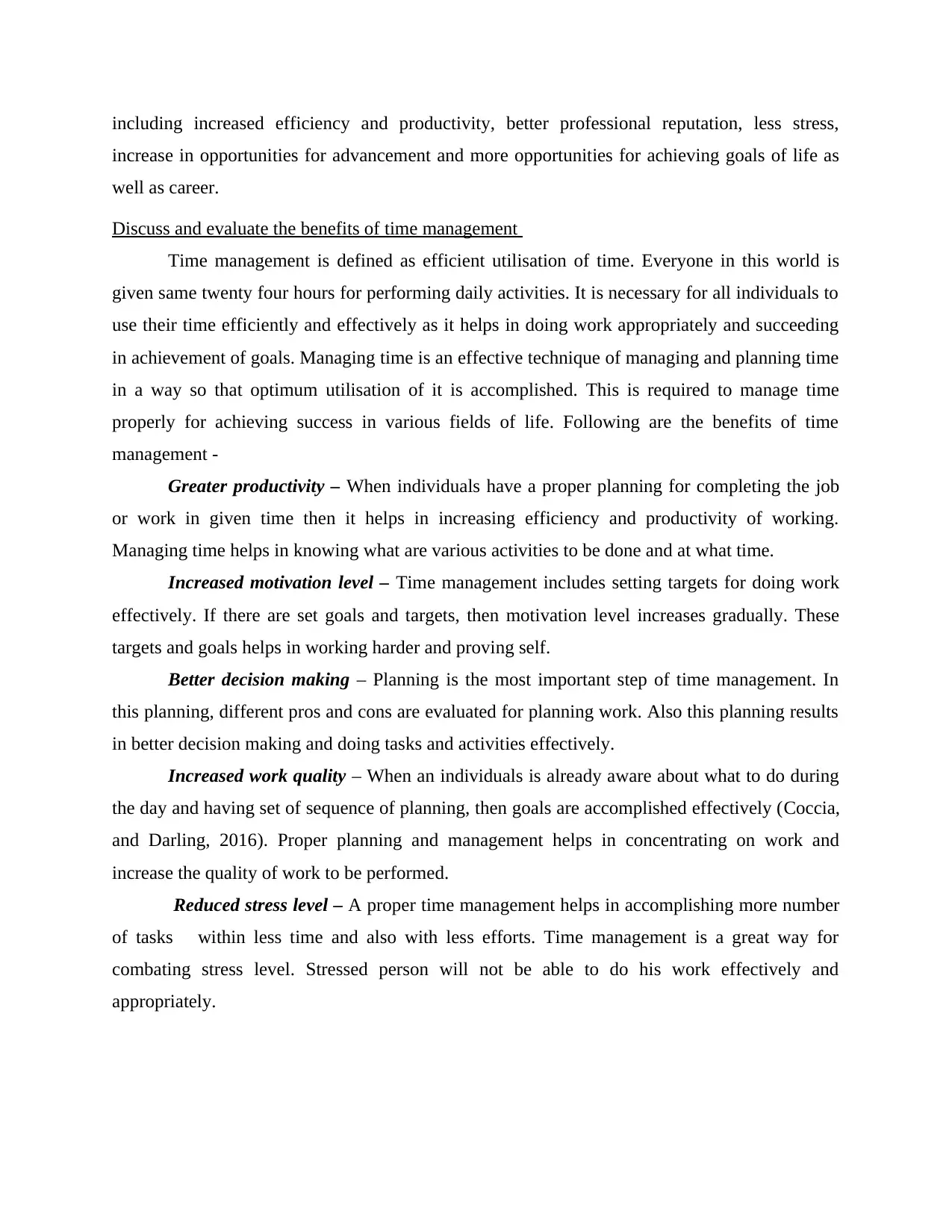
including increased efficiency and productivity, better professional reputation, less stress,
increase in opportunities for advancement and more opportunities for achieving goals of life as
well as career.
Discuss and evaluate the benefits of time management
Time management is defined as efficient utilisation of time. Everyone in this world is
given same twenty four hours for performing daily activities. It is necessary for all individuals to
use their time efficiently and effectively as it helps in doing work appropriately and succeeding
in achievement of goals. Managing time is an effective technique of managing and planning time
in a way so that optimum utilisation of it is accomplished. This is required to manage time
properly for achieving success in various fields of life. Following are the benefits of time
management -
Greater productivity – When individuals have a proper planning for completing the job
or work in given time then it helps in increasing efficiency and productivity of working.
Managing time helps in knowing what are various activities to be done and at what time.
Increased motivation level – Time management includes setting targets for doing work
effectively. If there are set goals and targets, then motivation level increases gradually. These
targets and goals helps in working harder and proving self.
Better decision making – Planning is the most important step of time management. In
this planning, different pros and cons are evaluated for planning work. Also this planning results
in better decision making and doing tasks and activities effectively.
Increased work quality – When an individuals is already aware about what to do during
the day and having set of sequence of planning, then goals are accomplished effectively (Coccia,
and Darling, 2016). Proper planning and management helps in concentrating on work and
increase the quality of work to be performed.
Reduced stress level – A proper time management helps in accomplishing more number
of tasks within less time and also with less efforts. Time management is a great way for
combating stress level. Stressed person will not be able to do his work effectively and
appropriately.
increase in opportunities for advancement and more opportunities for achieving goals of life as
well as career.
Discuss and evaluate the benefits of time management
Time management is defined as efficient utilisation of time. Everyone in this world is
given same twenty four hours for performing daily activities. It is necessary for all individuals to
use their time efficiently and effectively as it helps in doing work appropriately and succeeding
in achievement of goals. Managing time is an effective technique of managing and planning time
in a way so that optimum utilisation of it is accomplished. This is required to manage time
properly for achieving success in various fields of life. Following are the benefits of time
management -
Greater productivity – When individuals have a proper planning for completing the job
or work in given time then it helps in increasing efficiency and productivity of working.
Managing time helps in knowing what are various activities to be done and at what time.
Increased motivation level – Time management includes setting targets for doing work
effectively. If there are set goals and targets, then motivation level increases gradually. These
targets and goals helps in working harder and proving self.
Better decision making – Planning is the most important step of time management. In
this planning, different pros and cons are evaluated for planning work. Also this planning results
in better decision making and doing tasks and activities effectively.
Increased work quality – When an individuals is already aware about what to do during
the day and having set of sequence of planning, then goals are accomplished effectively (Coccia,
and Darling, 2016). Proper planning and management helps in concentrating on work and
increase the quality of work to be performed.
Reduced stress level – A proper time management helps in accomplishing more number
of tasks within less time and also with less efforts. Time management is a great way for
combating stress level. Stressed person will not be able to do his work effectively and
appropriately.
Paraphrase This Document
Need a fresh take? Get an instant paraphrase of this document with our AI Paraphraser
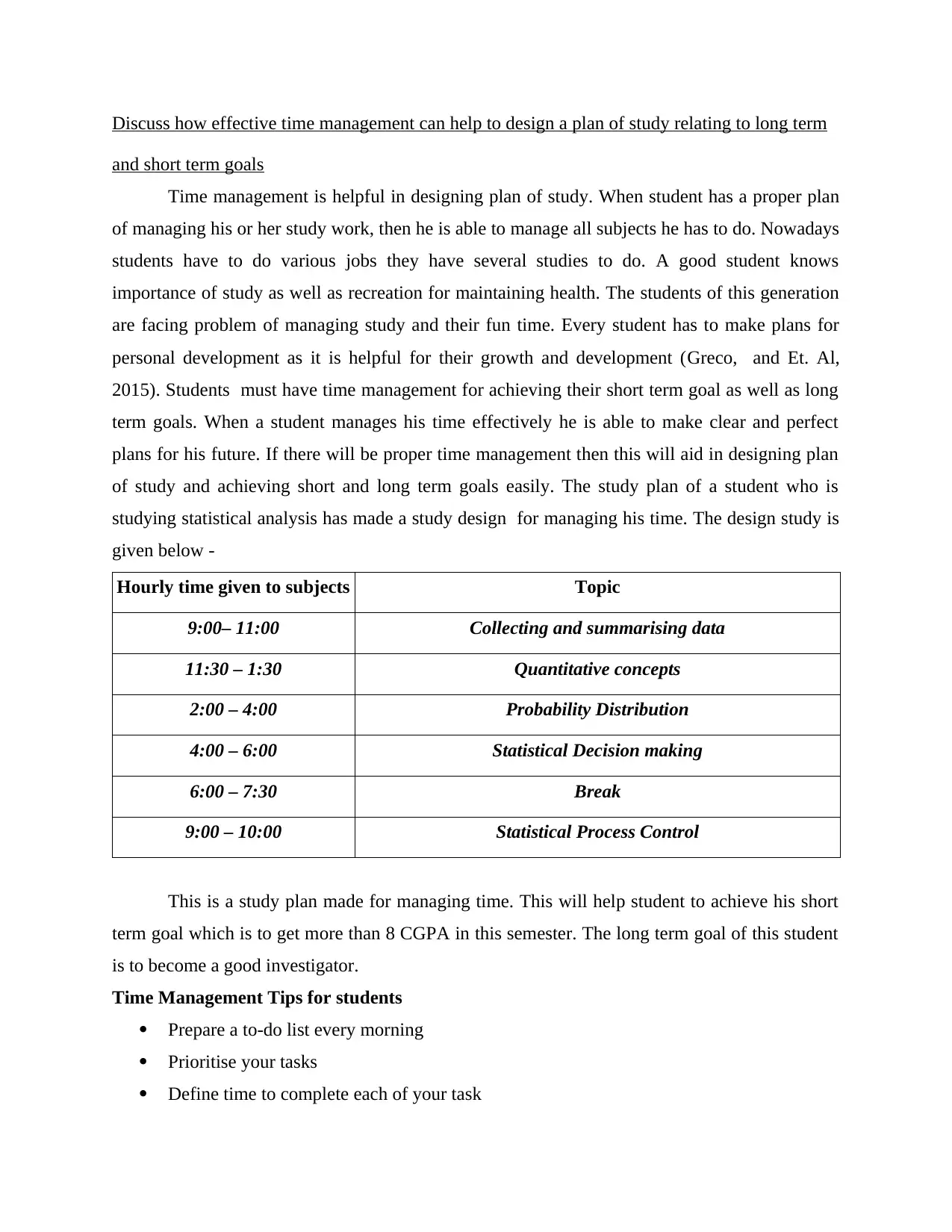
Discuss how effective time management can help to design a plan of study relating to long term
and short term goals
Time management is helpful in designing plan of study. When student has a proper plan
of managing his or her study work, then he is able to manage all subjects he has to do. Nowadays
students have to do various jobs they have several studies to do. A good student knows
importance of study as well as recreation for maintaining health. The students of this generation
are facing problem of managing study and their fun time. Every student has to make plans for
personal development as it is helpful for their growth and development (Greco, and Et. Al,
2015). Students must have time management for achieving their short term goal as well as long
term goals. When a student manages his time effectively he is able to make clear and perfect
plans for his future. If there will be proper time management then this will aid in designing plan
of study and achieving short and long term goals easily. The study plan of a student who is
studying statistical analysis has made a study design for managing his time. The design study is
given below -
Hourly time given to subjects Topic
9:00– 11:00 Collecting and summarising data
11:30 – 1:30 Quantitative concepts
2:00 – 4:00 Probability Distribution
4:00 – 6:00 Statistical Decision making
6:00 – 7:30 Break
9:00 – 10:00 Statistical Process Control
This is a study plan made for managing time. This will help student to achieve his short
term goal which is to get more than 8 CGPA in this semester. The long term goal of this student
is to become a good investigator.
Time Management Tips for students
Prepare a to-do list every morning
Prioritise your tasks
Define time to complete each of your task
and short term goals
Time management is helpful in designing plan of study. When student has a proper plan
of managing his or her study work, then he is able to manage all subjects he has to do. Nowadays
students have to do various jobs they have several studies to do. A good student knows
importance of study as well as recreation for maintaining health. The students of this generation
are facing problem of managing study and their fun time. Every student has to make plans for
personal development as it is helpful for their growth and development (Greco, and Et. Al,
2015). Students must have time management for achieving their short term goal as well as long
term goals. When a student manages his time effectively he is able to make clear and perfect
plans for his future. If there will be proper time management then this will aid in designing plan
of study and achieving short and long term goals easily. The study plan of a student who is
studying statistical analysis has made a study design for managing his time. The design study is
given below -
Hourly time given to subjects Topic
9:00– 11:00 Collecting and summarising data
11:30 – 1:30 Quantitative concepts
2:00 – 4:00 Probability Distribution
4:00 – 6:00 Statistical Decision making
6:00 – 7:30 Break
9:00 – 10:00 Statistical Process Control
This is a study plan made for managing time. This will help student to achieve his short
term goal which is to get more than 8 CGPA in this semester. The long term goal of this student
is to become a good investigator.
Time Management Tips for students
Prepare a to-do list every morning
Prioritise your tasks
Define time to complete each of your task
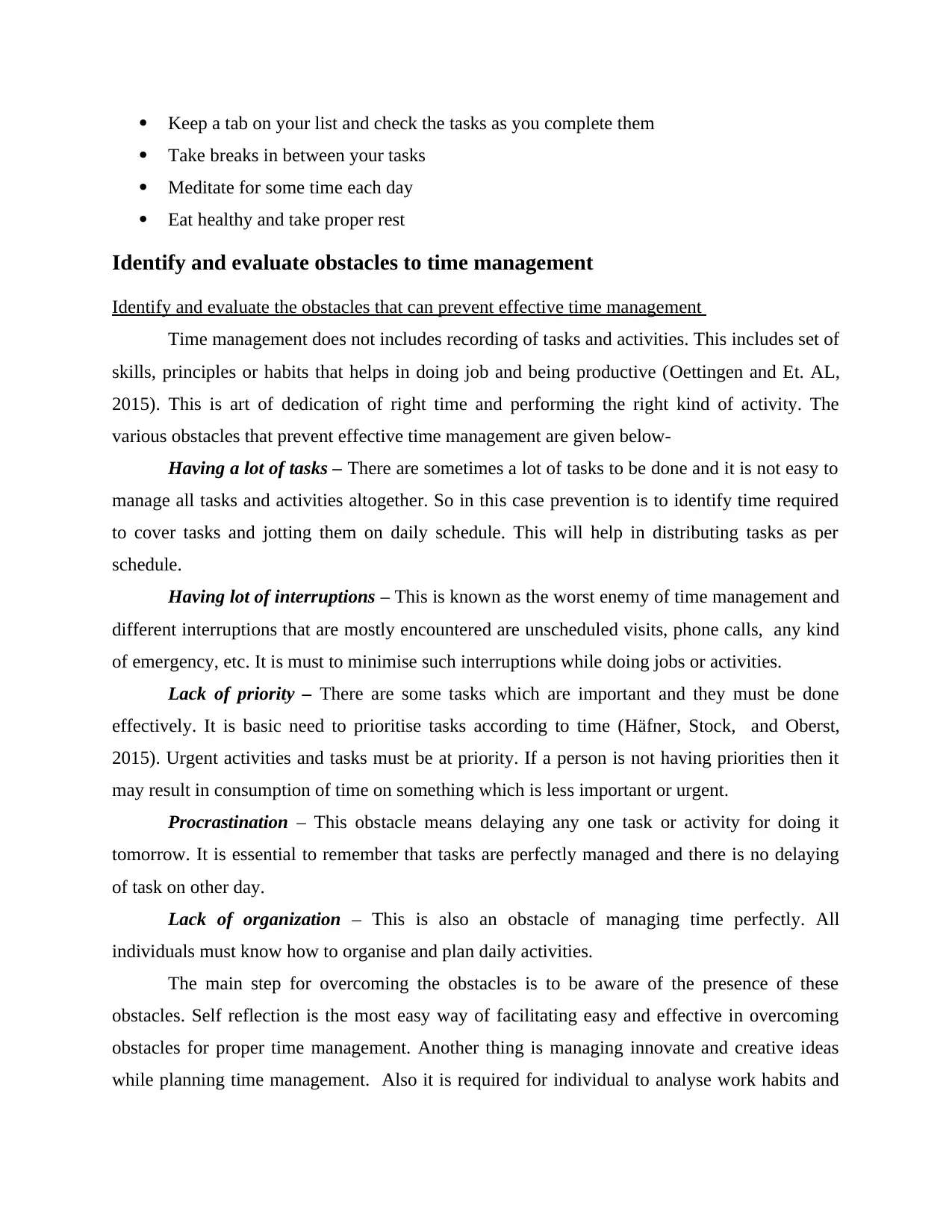
Keep a tab on your list and check the tasks as you complete them
Take breaks in between your tasks
Meditate for some time each day
Eat healthy and take proper rest
Identify and evaluate obstacles to time management
Identify and evaluate the obstacles that can prevent effective time management
Time management does not includes recording of tasks and activities. This includes set of
skills, principles or habits that helps in doing job and being productive (Oettingen and Et. AL,
2015). This is art of dedication of right time and performing the right kind of activity. The
various obstacles that prevent effective time management are given below-
Having a lot of tasks – There are sometimes a lot of tasks to be done and it is not easy to
manage all tasks and activities altogether. So in this case prevention is to identify time required
to cover tasks and jotting them on daily schedule. This will help in distributing tasks as per
schedule.
Having lot of interruptions – This is known as the worst enemy of time management and
different interruptions that are mostly encountered are unscheduled visits, phone calls, any kind
of emergency, etc. It is must to minimise such interruptions while doing jobs or activities.
Lack of priority – There are some tasks which are important and they must be done
effectively. It is basic need to prioritise tasks according to time (Häfner, Stock, and Oberst,
2015). Urgent activities and tasks must be at priority. If a person is not having priorities then it
may result in consumption of time on something which is less important or urgent.
Procrastination – This obstacle means delaying any one task or activity for doing it
tomorrow. It is essential to remember that tasks are perfectly managed and there is no delaying
of task on other day.
Lack of organization – This is also an obstacle of managing time perfectly. All
individuals must know how to organise and plan daily activities.
The main step for overcoming the obstacles is to be aware of the presence of these
obstacles. Self reflection is the most easy way of facilitating easy and effective in overcoming
obstacles for proper time management. Another thing is managing innovate and creative ideas
while planning time management. Also it is required for individual to analyse work habits and
Take breaks in between your tasks
Meditate for some time each day
Eat healthy and take proper rest
Identify and evaluate obstacles to time management
Identify and evaluate the obstacles that can prevent effective time management
Time management does not includes recording of tasks and activities. This includes set of
skills, principles or habits that helps in doing job and being productive (Oettingen and Et. AL,
2015). This is art of dedication of right time and performing the right kind of activity. The
various obstacles that prevent effective time management are given below-
Having a lot of tasks – There are sometimes a lot of tasks to be done and it is not easy to
manage all tasks and activities altogether. So in this case prevention is to identify time required
to cover tasks and jotting them on daily schedule. This will help in distributing tasks as per
schedule.
Having lot of interruptions – This is known as the worst enemy of time management and
different interruptions that are mostly encountered are unscheduled visits, phone calls, any kind
of emergency, etc. It is must to minimise such interruptions while doing jobs or activities.
Lack of priority – There are some tasks which are important and they must be done
effectively. It is basic need to prioritise tasks according to time (Häfner, Stock, and Oberst,
2015). Urgent activities and tasks must be at priority. If a person is not having priorities then it
may result in consumption of time on something which is less important or urgent.
Procrastination – This obstacle means delaying any one task or activity for doing it
tomorrow. It is essential to remember that tasks are perfectly managed and there is no delaying
of task on other day.
Lack of organization – This is also an obstacle of managing time perfectly. All
individuals must know how to organise and plan daily activities.
The main step for overcoming the obstacles is to be aware of the presence of these
obstacles. Self reflection is the most easy way of facilitating easy and effective in overcoming
obstacles for proper time management. Another thing is managing innovate and creative ideas
while planning time management. Also it is required for individual to analyse work habits and
⊘ This is a preview!⊘
Do you want full access?
Subscribe today to unlock all pages.

Trusted by 1+ million students worldwide
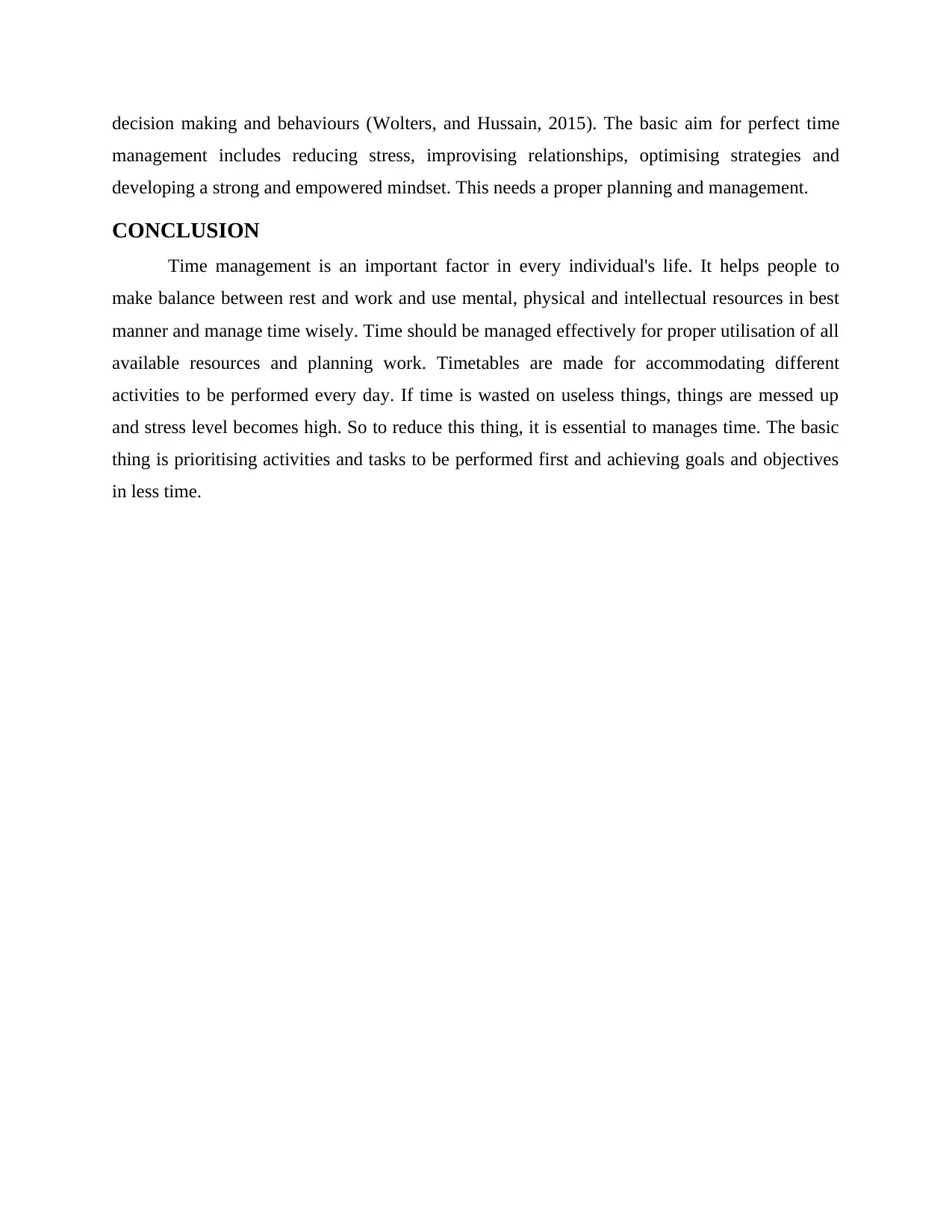
decision making and behaviours (Wolters, and Hussain, 2015). The basic aim for perfect time
management includes reducing stress, improvising relationships, optimising strategies and
developing a strong and empowered mindset. This needs a proper planning and management.
CONCLUSION
Time management is an important factor in every individual's life. It helps people to
make balance between rest and work and use mental, physical and intellectual resources in best
manner and manage time wisely. Time should be managed effectively for proper utilisation of all
available resources and planning work. Timetables are made for accommodating different
activities to be performed every day. If time is wasted on useless things, things are messed up
and stress level becomes high. So to reduce this thing, it is essential to manages time. The basic
thing is prioritising activities and tasks to be performed first and achieving goals and objectives
in less time.
management includes reducing stress, improvising relationships, optimising strategies and
developing a strong and empowered mindset. This needs a proper planning and management.
CONCLUSION
Time management is an important factor in every individual's life. It helps people to
make balance between rest and work and use mental, physical and intellectual resources in best
manner and manage time wisely. Time should be managed effectively for proper utilisation of all
available resources and planning work. Timetables are made for accommodating different
activities to be performed every day. If time is wasted on useless things, things are messed up
and stress level becomes high. So to reduce this thing, it is essential to manages time. The basic
thing is prioritising activities and tasks to be performed first and achieving goals and objectives
in less time.
Paraphrase This Document
Need a fresh take? Get an instant paraphrase of this document with our AI Paraphraser
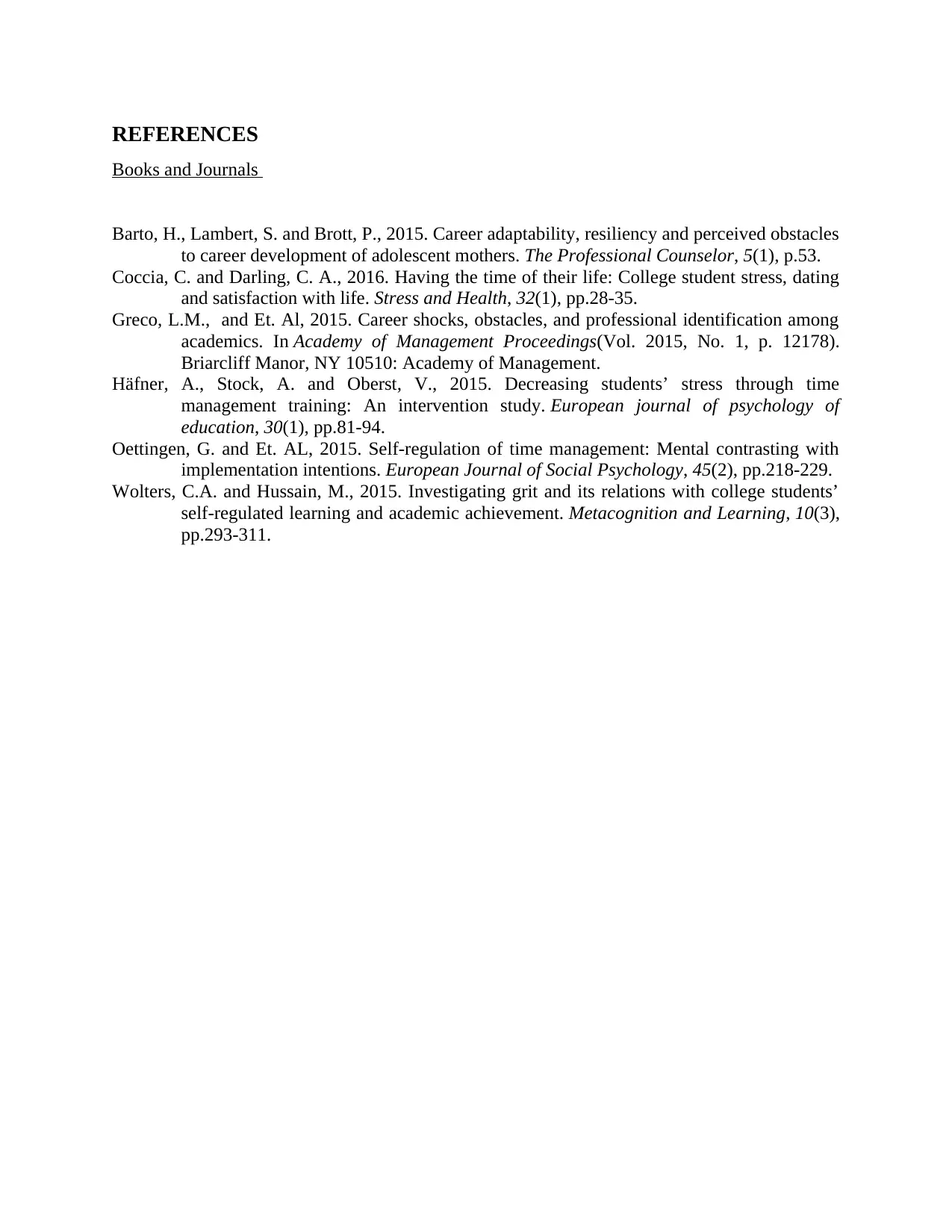
REFERENCES
Books and Journals
Barto, H., Lambert, S. and Brott, P., 2015. Career adaptability, resiliency and perceived obstacles
to career development of adolescent mothers. The Professional Counselor, 5(1), p.53.
Coccia, C. and Darling, C. A., 2016. Having the time of their life: College student stress, dating
and satisfaction with life. Stress and Health, 32(1), pp.28-35.
Greco, L.M., and Et. Al, 2015. Career shocks, obstacles, and professional identification among
academics. In Academy of Management Proceedings(Vol. 2015, No. 1, p. 12178).
Briarcliff Manor, NY 10510: Academy of Management.
Häfner, A., Stock, A. and Oberst, V., 2015. Decreasing students’ stress through time
management training: An intervention study. European journal of psychology of
education, 30(1), pp.81-94.
Oettingen, G. and Et. AL, 2015. Self‐regulation of time management: Mental contrasting with
implementation intentions. European Journal of Social Psychology, 45(2), pp.218-229.
Wolters, C.A. and Hussain, M., 2015. Investigating grit and its relations with college students’
self-regulated learning and academic achievement. Metacognition and Learning, 10(3),
pp.293-311.
Books and Journals
Barto, H., Lambert, S. and Brott, P., 2015. Career adaptability, resiliency and perceived obstacles
to career development of adolescent mothers. The Professional Counselor, 5(1), p.53.
Coccia, C. and Darling, C. A., 2016. Having the time of their life: College student stress, dating
and satisfaction with life. Stress and Health, 32(1), pp.28-35.
Greco, L.M., and Et. Al, 2015. Career shocks, obstacles, and professional identification among
academics. In Academy of Management Proceedings(Vol. 2015, No. 1, p. 12178).
Briarcliff Manor, NY 10510: Academy of Management.
Häfner, A., Stock, A. and Oberst, V., 2015. Decreasing students’ stress through time
management training: An intervention study. European journal of psychology of
education, 30(1), pp.81-94.
Oettingen, G. and Et. AL, 2015. Self‐regulation of time management: Mental contrasting with
implementation intentions. European Journal of Social Psychology, 45(2), pp.218-229.
Wolters, C.A. and Hussain, M., 2015. Investigating grit and its relations with college students’
self-regulated learning and academic achievement. Metacognition and Learning, 10(3),
pp.293-311.
1 out of 8
Related Documents
Your All-in-One AI-Powered Toolkit for Academic Success.
+13062052269
info@desklib.com
Available 24*7 on WhatsApp / Email
![[object Object]](/_next/static/media/star-bottom.7253800d.svg)
Unlock your academic potential
Copyright © 2020–2026 A2Z Services. All Rights Reserved. Developed and managed by ZUCOL.




